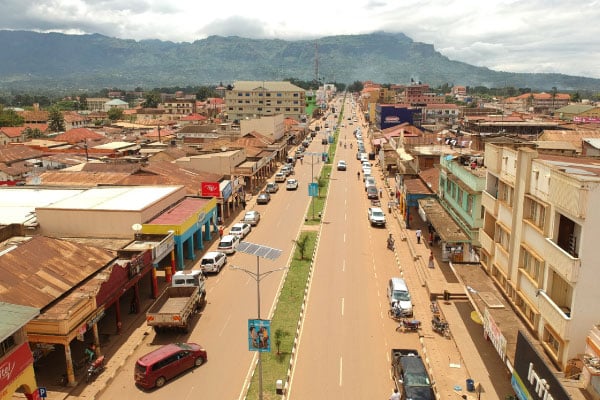Prime
Mbale just a city on paper, residents say

An aerial view of a section of Mbale City on January 4. Residents in Mbale City have said there is a need to transform the city into a revived urban area, with potential to generate high local revenue collection. PHOTO/SIKO CONSULTS
Residents in Mbale City have said there is a need to transform the city into a revived urban area, with potential to generate high local revenue .
Mbale is one of the towns that were elevated by the government to city status on July 1, 2020, but locals say there is nothing to show for it on the ground.
“It is still a city on paper. Nothing has come with it so far, not even in terms of cleanliness. Heaps of garbage are everywhere,” Mr Isaac Wegulo, the LC1 chairperson, of Cathedral cell, said.
He said Mbale was on the right track in the 1970s and 1980s, but the successive leadership, starting from 2000 messed it up.
“It was the first town to be granted official status of an urban authority, leave alone being the cleanest town in East Africa but those efforts were messed up due to poor leadership,” Mr Wegulo said.
Mr Akim Watenyeli, a resident and elder, said it is time the government considers setting up fully fledged urban renewal programmes to support the newly created cities since they face challenges of low revenue and funding.
“This programme should come with bulky financial support to help the new cities, but short of that, they will remain towns being called cities,” he said.
Mr Watenyeli said the new leadership should also undo the mistakes, which include alleged allocation of green spaces, road reserves, and sewer lines to developers.
“The new leadership should deal with illegal structures built on road reserves, sewer lines and also recover green spaces, which had been fraudulently given away to purported developers,” he said.
Mr Watenyeli said although the city has the potential to generate about Shs10b annually, due to corruption, unfair tax policies, among others, the council has been collecting less than Shs1 billion.
Figures obtained from the council indicate that the municipality collected Shs1.5b out of the approved budget of Shs3.9b in the Financial Year 2017/2018 and Shs1.4b out of the approved budget of Shs4.8b in Financial Year 2018/2019.
In the Financial Year 2015/2016, Shs911m was collected out of about Shs3b approved budget and in Financial Year 2016/2017, Shs1b was realised out of the Shs4b budget.
Mr James Mafabi, another resident, said the golf course and forest areas have been turned into grazing fields for stray animals because of negligence.
“There is a lot that needs to be done because you find a joinder street has been turned into a stage for special hire and boda boda riders,” he said.
Mr Mafabi said some dilapidated buildings have been abandoned and few turned into local produce stores especially in the industrial area.
Mr Micheal Wandulu, a resident of Nkoma ward in Northern City Division, said the city officials should fight the tendencies of awarding tenders to their colleagues and relatives, saying this undermines revenue collection.
“The new leadership should take the challenge posed by corruption head on because it is the root cause of all failure,” he said.
In the just concluded city mayoral elections, Mr Cassim Namugali Wamatambu, the Forum for Democratic Change (FDC) flag bearer, was elected as city mayor after defeating the incumbent, Mr Mutwalibi Zandya.
Mr Namugali said he will start by demolishing houses built on sewer lines and road reserves.
“My role is to ensure that Mbale regains its former glory through offering corrupt free leadership,” he said.
“How can Mbale City fail to collect at least a billion shillings of revenue each financial year. This tells you how much money is being swindled by the tax officers,” he added.
However, the acting public relations officers of Mbale City, Mr James Kutosi, said they are designing strategies to ensure that local revenue collection is boosted.
“We want to have a lively and competitive city. We are going to put up first class health facilities to meet the standards of the new city,” he said.
Mr Kutosi said construction of more roads under Uganda Support to Municipality Infrastructure Development programme has started following the completion of Republic, Pallisa, Nabuyonga Rise and Mugisu Hill.
“We are going to light up the city to ensure people are secure with their properties and the transportation industry will also be digitalised,” he said.




